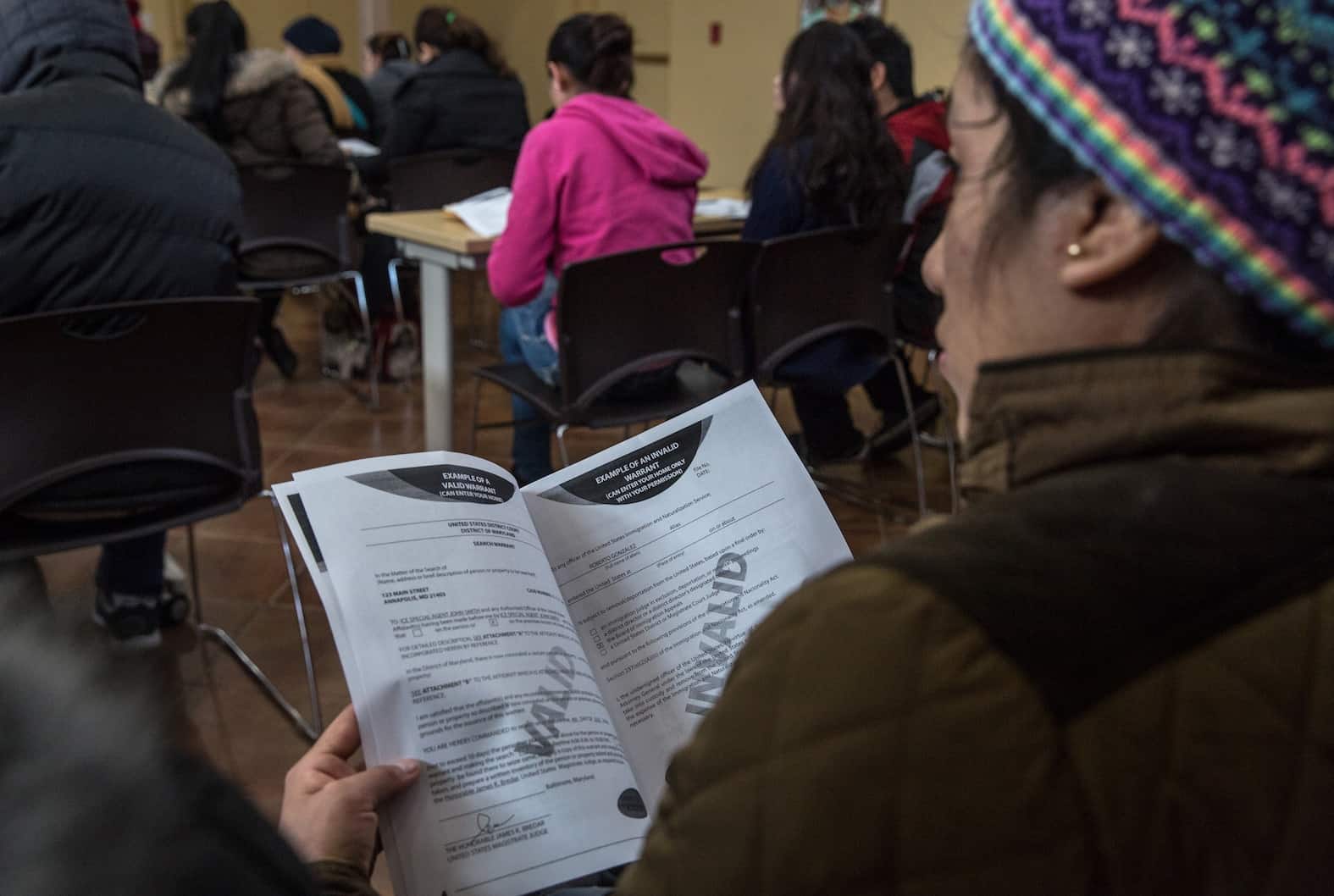“If they come to the house, do we have to open the door?” asked a mother in the basement community room at CASA of Maryland, an advocacy group based in suburban Washington.
“They need an order, a paper signed by a judge,” attorney Paulina Vera replied. “If you open the door, that’s like giving permission to come in. That’s why it’s important for them to pass it under the door.”
“They knocked violently at 6 a.m. this morning,” a 33-year-old cook from Mexico said, still stunned and tearful from the experience. “They didn’t slide anything under. After 10 minutes, they went away.”
“If I’m in the market with my daughter and they ask for my identification, do I have to do anything?” asked a 36-year-old mother from El Salvador. Her 4-year-old, in a pink jacket, dozed in her arms.
“Ask if you are detained,” Vera said. “If not, go calmly.”
This is the essence of the resistance campaign being preached by advocacy groups in response to a new effort to deport families from Central America who have entered the country illegally over the past two years.
An official with U.S. Immigration and Customs Enforcement said in an email that “ICE officers and agents conduct immigration enforcement actions consistent with their authorities under federal law and in accordance with the Constitution.”
The raids — which swept up 121 parents and children on New Year’s weekend, primarily in Georgia, Texas and North Carolina — will target only those recent arrivals who have been given final deportation orders, the Obama administration says.
But they have triggered an outcry from Democrats in Congress and are provoking panic among a far broader swath of this country’s population of undocumented Central American immigrants, most of whom believed for years that as long as they obey the law, their life in the United States is not at risk.
In the Washington area and elsewhere, merchants, advocates and immigrants say people are afraid to work, shop, or visit the doctor. In Prince George’s County, where Hyattsville is located, officials are reporting lower attendance than usual in schools with large immigrant populations. Schools chief executive Kevin Maxwell this week called for federal authorities “to see schools and other public gathering places as areas where no enforcement activities should take place.”
Health clinics are “seeing a lot more missed visits, especially prenatal care and children’s visits, and our social workers are getting a lot of questions about whether it is safe to send their children to school,” said Maria Gomez, president of Mary’s Center, which operates in the District of Columbia and Montgomery County.
“We are telling people to make sure their kids know where to go in case their parents are detained, and we are trying to reassure them that clinics and schools are safe.”
Alicia Wilson, executive director of La Clinica del Pueblo in the District of Columbia, noted that many immigrants from Central America “have survived war, violent gangs and extreme physical hardship” in their homelands. “We are extremely distressed to see the fear that these raids have created in the community,” she said.
CASA has held about 30 “know your rights” sessions in Maryland, Virginia and Pennsylvania since Jan. 5 to make sure that people know that in the United States, even undocumented immigrants have civil rights.
Organizations in other states are doing the same.
The five main pieces of advice, all offered in Spanish, are: Don’t open the door; say nothing; sign nothing; memorize the phone number of an attorney or rights group; and prepare an emergency plan to take care of your family and affairs if you are detained.
CASA is handing out packets and wallet cards with the information. Its Facebook page, presenting weekly advice videos and a 24-hour hotline number, has received more traffic and comments this month than ever, one staffer said.
At the session in Hyattsville on Tuesday, Vera, the attorney, flashed a 24-hour emergency hotline number on a screen. Nearly every one of the 40 people in attendance entered the digits into their cellphones.
The 36-year-old mother who was there said she takes precautions when leaving home and has postponed buying necessities such as food and diapers. Like others at the session, she asked that her name not be published for fear that ICE would knock on her door next.
“When I’m out of the apartment, I look on all sides,” she said. “Because you don’t know if they are waiting for you.”
The cook from Mexico said she and her family stayed in their apartment for two hours Tuesday morning after the agents knocked on her door. When the coast seemed clear, she took her 13-year-old daughter, a U.S. citizen, to school. The girl was reluctant to say goodbye: “Mami, I’m afraid I won’t see you again!”
A father from Guatemala attended the workshop to learn how he can help his daughter, 14, and son, 7, who crossed the border in June 2014 to join their parents and escape gang violence.
The children were detained at the border, then released and given a court date later this month. The man, who installs drywall for a living, said he can’t afford the $15,000 or so he would need for an attorney. Pro bono attorneys, he said, have long waiting lists.
A devout Seventh Day Adventist, he has faith that God will work things out. He plans to have his daughter bring her straight-A report cards from High Point High School to the hearing and address the judge in the English she has quickly learned.
“When there are zero possibilities,” the immigrant said, “that’s when God makes miracles.”
– – –
The Washington Post’s Arelis R. Hernández contributed to this report.
© 2016, The Washington Post






